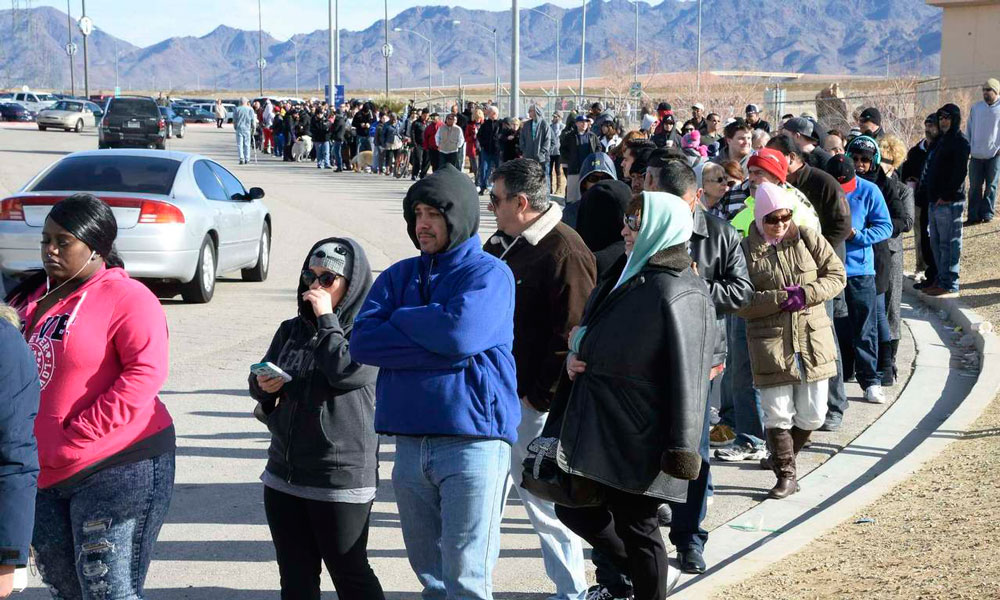
Why Nevada Doesn’t Have the Powerball
A combination of resort-industry opposition and lack of legislative momentum has kept Nevada, a state known for its legalized gambling, out of the lottery for decades. As a result, many state residents headed to the border for Powerball tickets this week, in hopes of getting their hands on the $1.5 billion jackpot.
If Nevada residents want to take part in the Powerball—not an uncommon desire, considering the record jackpots of late—they have to cross the state border.
That’s because Nevada is one of just six states in the country that don’t allow for legal lottery games. Three of the other five states—Alabama, Mississippi, and Utah—have historically shied away from the lottery due to religious concerns. Alaska has cited its small population size as a deterrent. And, so far, Hawaii has been unable to pass lottery legislation.
But the state of affairs in Nevada is a bit different. Efforts to pass lottery legislation have failed partly because the casino industry, a major employer in the state, is so powerful. The Las Vegas Review-Journal last year reported that legislative attempts to allow for a state lottery had failed nearly 30 times since 1975, even though about 70 percent of Nevada residents want a state lottery, according to a 2009 survey.
The State of Lottery in Nevada
The Nevada Resort Association, one of the leading voices opposed to the lottery, suggests that it poses far greater financial risks than reward to the state. The group’s president, Virginia Valentine, told Vegas Inc. last year that the group was eyeing different ways to fund education.
“Now is not the time to be focusing on a regressive tax which provides no immediate revenue solution, does not create quality jobs, and has not proven to solve revenue problems in other states,” Valentine told the news outlet. “The gaming industry is instead focused on the serious discussions being held about adequate funding of education and providing a long-term, broad-based solution to our state’s tax structure.”
And while the gaming and resort industries have largely been the most prominent opponents of the issue in Nevada, they aren’t the only ones. Nonprofit and religious groups, such as the Nevada Families Eagle Forum, have come out against lottery legislation. The Eagle Forum has argued that education benefits are offset by the encouragement of gambling among young adults.
“One of the problems we face as we increase youth gambling availability through lotteries is that we will end up needing more money due to the increase in social problems requiring additional government programs for intervention,” the nonprofit’s treasurer, Janine Hansen, argued [PDF] during a Nevada Legislature committee meeting on the issue last year.
Massive Lines for Tickets
That’s led to something of a run on tickets near the border. The Associated Press reported Wednesday that the most popular location to purchase Powerball tickets in the entire nation is the Primm Valley Lotto Store, located about 40 miles from Las Vegas, just across the border in California. According to the Multi-State Lottery Association, such border locations tend to attract the largest number of ticket sales.
Texas Lottery Executive Director Gary Grief suggested that holdout states are missing out on a valuable lottery revenue. A 2011 article by the Las Vegas Sun supported this idea, noting that gaming revenue in Nevada ranked below 11 other states that have both lottery and casino offerings.
“What that means for policymakers, that’s their business,” Grief told the AP. “I’m sure they’re watching those dollars flow out of their state.”
The Review-Journal this week noted that even if the stars aligned in support of a lottery program, adoption wouldn’t come right away because the state’s constitution would need to be amended.
So, for now, if Nevada residents want to take part in the Powerball, their best bet remains heading for the border.
Hundreds of people wait to enter a California lotto store on the Nevada/California state line on Saturday. (Gene Blevins/Reuters)






Comments